- Islamic creed
- /
- Creed and Quran Miraculousness
Forward:
Dear brother, this is the 18th lesson of the series "Aqeedah and the Inimitability of the Quran". We tackled "Lust" as the primary topic in the previous lecture besides "Justic and Discipline" as secondary topics. Today we are moving to another topic which is related to "lust".
1- Allah is the Lord of the worlds:
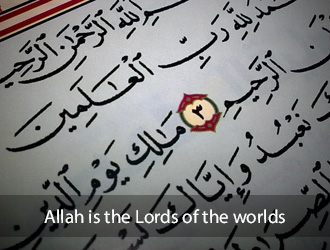 When man's life is driven by his lusts away from the Divine Method, what will happen to him? Let me first tell you the fact that the Almighty Allah is the Lord of the Worlds, and His Lordship is manifested in looking after us physically and spiritually, and in order to make this point clear to you I would like to give you the following example: When the manager of a company appoints a new employee in his company, he will first test his capabilities for six month, and so his mission in this period is to count the mistakes made by this employee. If this employee makes many deadly mistakes,, the manager is supposed to fire as it is his mission to so. However, if this employee is his son, he will treat him in a different way, will not he? Instead of counting his son's mistakes, the father will just direct his son trying to draws his attention to the mistakes he commits, explain to him how he can avoid them, offer him a piece of advice and guide him to the right way of managing things. The father does these things out of his parental mercy and keenness on his son's success in his position, so he follows every move he makes, he checks every error, he guides him, he advises him and sometimes he punishes him and be strict with him. The father's supervision and strictness are out of his mercy that is aimed at making this newly appointed employee a successful man.
When man's life is driven by his lusts away from the Divine Method, what will happen to him? Let me first tell you the fact that the Almighty Allah is the Lord of the Worlds, and His Lordship is manifested in looking after us physically and spiritually, and in order to make this point clear to you I would like to give you the following example: When the manager of a company appoints a new employee in his company, he will first test his capabilities for six month, and so his mission in this period is to count the mistakes made by this employee. If this employee makes many deadly mistakes,, the manager is supposed to fire as it is his mission to so. However, if this employee is his son, he will treat him in a different way, will not he? Instead of counting his son's mistakes, the father will just direct his son trying to draws his attention to the mistakes he commits, explain to him how he can avoid them, offer him a piece of advice and guide him to the right way of managing things. The father does these things out of his parental mercy and keenness on his son's success in his position, so he follows every move he makes, he checks every error, he guides him, he advises him and sometimes he punishes him and be strict with him. The father's supervision and strictness are out of his mercy that is aimed at making this newly appointed employee a successful man.
2- lusts are neutral:
The Almighty Allah is the Lord of the Worlds, and He created us to bestow His Mercy upon us, just like the father who is merciful to his son. Lusts, as I mentioned in a previous lecture, are neutral; they are the means through which we either sublime to the highest levels or hit rock bottom. Moreover, because man owns the free will, all his lusts, fortunes and characteristics are neutral and they are his means to sublime or to hit rock bottom.
How does Allah treat whoever is driven by his lusts which are against the Method of Allah, either by making his living unlawfully or by having illicit affairs with women? The Almighty Allah, the Lord of the Worlds, brings His servant's attention to the wrongdoings he commits, like making him listen to a friend's advice, making him attend a religious lesson in which the Sheikh say something relevant to the sin he commits or afflicting him with calamities which are related to the his sin. In fact the connection between the calamity and the sin is a Divine educational Method by which Allah seems to be saying to his servant, ""O My servant, this hardship, you are in, is because of such and such sin", and in this case the servant is monitored by the Almighty Allah.
3- The Divine Observation is part of Allah's Mercy upon His servants:
By the way, when you feel Allah watching over you, you should know that this is a great grace bestowed upon you. Hence, when you feel Allah's prompt response to the sin you have committed, by sending someone to advise you, by a calamity you are afflicted with, by making you feel that something disastrous will happen to you, by impoverishing you or by an embarrassing situation He puts you in, this means that you are under the Divine Protection, which in its turn implies that your sin can be avoided, and so you will be spiritually healthy again as you should be. I would like to repeat what I've just said, when you feel that Allah monitors you, punishes you, brings your attention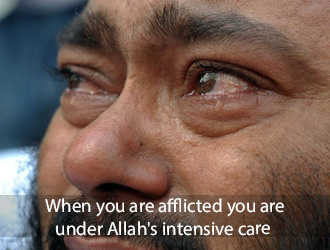 to your sins, disciplines you and puts you in hardship inspiring you that the hardship in which you are is the effect of the sin you have committed, only then you will reconsider your deeds.
to your sins, disciplines you and puts you in hardship inspiring you that the hardship in which you are is the effect of the sin you have committed, only then you will reconsider your deeds.
A man was about to pay the Zakat of his money, but his wife put pressure on him asking him not to do so and to buy new furniture to the house instead. He responded to her request and used the Zakat money in that cause although Zakat is an obligatory act of worship. This man told me that he had a car accident, and repairing his car cost him an amount of money that was as much as what he was supposed to pay for the Zakat. In this case the amount of money he paid is Allah's Message to this man reminding him of his error, and this accident was meant to draw his attention to it. Allah says:
﴾And as for those who are Fasiqun (disbelievers and disobedient to Allah), their abode will be the Fire, every time they wish to get away therefrom, they will be put back thereto, and it will be said to them: "Taste you the torment of the Fire which you used to deny." ﴿
Moreover, the Almighty Allah says:
﴾And certainly, We shall test you with something of fear, hunger, loss of wealth, lives and fruits, but give glad tidings to As-Sabirin (the patient ones, etc.)* Who, when afflicted with calamity, say: "Truly! To Allah we belong and truly, to Him we shall return."* They are those on whom are the Salawat (i.e. blessings, etc.) (i.e. who are blessed and will be forgiven) from their Lord, and (they are those who) receive His Mercy, ﴿
Dear brother,
﴾Evil (sins and disobedience of Allah, etc.) has appeared on land and sea because of what the hands of men have earned (by oppression and evil deeds, etc.), that Allah may make them taste a part of that which they have done, in order that they may return (by repenting to Allah, and begging His Pardon). ﴿
One might ask: What is the philosophy of afflictions in Islam?
4- The calamity is the guarantee of the believer's safety:
One can ask a simple question: Why is the car manufactured? The Answer is: In order to drive us from one place to another. In other words, the purpose of manufacturing it is to make it move, but why does it have breaks, then? The breaks stop the movement of the car, so it contradicts the purpose of manufacturing it. Thus, there is an obvious conflict between the two, but don't you agree with me that the breaks are the most crucial part of the car? Absolutely, they are! That is because they guarantee its safety. Much in the same line, calamities in the worldly life guarantee the safety of the believer.
In the coming lectures, I will explain to you the meaning of the calamities which befall the heedless, the deviated, the tyrants and the criminals, for these calamities are the dooming kind, whereas the calamities that befall the believers are their means through which they exalt in the Sight of Allah. As for the calamities of Prophets, peace be upon them, they are meant to manifest their perfection.
If we get back to the breaks of the car, we will notice that they are the most dangerous device in  the car, because they guarantee its safety. Similarly, the calamities though they bring pain and melancholy, they guarantee the safety of man. Furthermore, the Almighty Allah considers the calamities in the Quran "The hidden graces":
the car, because they guarantee its safety. Similarly, the calamities though they bring pain and melancholy, they guarantee the safety of man. Furthermore, the Almighty Allah considers the calamities in the Quran "The hidden graces":
﴾And has completed and perfected His Graces upon you, (both) apparent (i.e Islamic Monotheism, and the lawful pleasures of this world, including health, good looks, etc.) and hidden [i.e. One's Faith in Allah (of Islamic Monotheism) knowledge, wisdom, guidance for doing righteous deeds, and also the pleasures and delights of the Hereafter in Paradise, etc.]? ﴿
When you enter the Masjid and you find thousands of people in it, you should believe beyond doubt that most of them are Divinely dragged to Allah's House Masjid) after a wise Divine Treatment. Moreover, on the Day of Resurrection, and when all the hidden wisdom, behind the hardships in life, are unfolded before you, you will melt out of love to Allah, for the calamities you have been afflicted with in the worldly life. You have the free will in performing the Divine Assignment, but you do not have it when it comes to choosing your parents, the place you are born in, the date of your birth, the look and the physical characteristics you have or the talents you have. All these Divine Choices are for your own benefit, and on the Day of Resurrection, the secret behind Qada' and Qadar (the Divine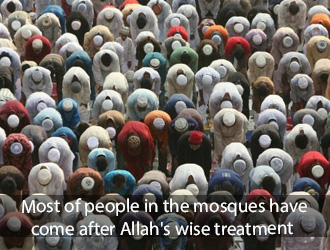 Preordainment and Predestination) will be unfolded, and you will realize that what you have got in the worldly life is the best for you and the situations you are in is the most perfect. Hence, these afflictions and hardship are wise Divine Means to teach you, and when you read the following incident in Surat Al-Qalam:
Preordainment and Predestination) will be unfolded, and you will realize that what you have got in the worldly life is the best for you and the situations you are in is the most perfect. Hence, these afflictions and hardship are wise Divine Means to teach you, and when you read the following incident in Surat Al-Qalam:
﴾We tried the people of the garden, when they swore to pluck the fruits of the (garden) in the morning* Without saying: Insha' Allah (If Allah will). ﴿
Because they have never given the poor any fruits of their gardens, the Almighty Allah says:
﴾Then there passed by on the (garden) something (fire) from your Lord at night and burnt it while they were asleep.﴿
According to contemporary terms, the gardens are hit by frost:
﴾So the (garden) became black by the morning, like a pitch dark night (in complete ruins).﴿
They looked like gardens where their fruits had been reaped:
﴾But when they saw the (garden), they said: "Verily, we have gone astray," ﴿
They couldn't recognize their own gardens, but after they made sure that they were their gardens they said:
﴾(Then they said): "Nay! Indeed we are deprived of (the fruits)!" The best among them said: "Did I not tell you: why do you not say: Insha' Allah (If Allah will)." They said: "Glory to Our Lord! Verily, we have been Zalimun (wrong-doers, etc.)."﴿
The moral lesson of the story lies in the following Ayah:
﴾Such is the punishment (in this life) ﴿
As if Allah says to us, "O My servants, all kinds of similar calamities, you are afflicted with in the worldly life are but a Divine Message and a wake-up call so pay heed." Hence, when man is deviated from Allah's Path, or when he is driven by his lusts which are against the Divine Method, he deserves the Divine Treatment and Discipline, and surely Allah will draw his attention to the mistakes he has committed, and in such a case the believer's heroism lies in understanding the purpose of Allah's Reactions to his actions. The Almighty Allah says:
﴾Why should Allah punish you if you have thanked (Him) and have believed in Him. And Allah is Ever All-Appreciative (of good), All-Knowing. ﴿
In a Sahih Qudsi Hadith, the Almighty Allah says:
((O My slaves, were the first of you and the last of you, the human of you and the jinn of you to rise up in one place and make a request of Me, and were I to give everyone what he requested, that would not decrease what I have, any more than a needle decreases the sea if put into it. O My slaves, it is but your deeds that I reckon up for you and then recompense you for, so let him who finds good praise Allah and let him who finds other than that blame no one but himself.))
These words are crystal clear:
((…so let him who finds good praise Allah and let him who finds other than that blame no one but himself))
These are facts which are mentioned in the Quranic Ayat, Sahih Hadith and Prophetic guidance, and they all indicate that calamities hide profound wisdom within and they are meant to serve man. Not to mention that afflictions are hidden graces for the believers.
5- Fulfilling lusts according to Shari'ah is permissible:
Dear brother, being driven by lusts in the worldly life in a way that is against the Divine Method is  unacceptable, but you should know for certain that fulfilling lusts according to the Divine Method is fine. The effect of following one's lusts without the Divine Guidance is mentioned in the following Ayah:
unacceptable, but you should know for certain that fulfilling lusts according to the Divine Method is fine. The effect of following one's lusts without the Divine Guidance is mentioned in the following Ayah:
﴾And who is more astray than one who follows his own lusts, without guidance from Allah? ﴿
The opposite situation of the astray is that the one who fulfills his lust according to Allah's Guidance is on the safe side. This means that there is no deprivation in Islam because it is the religion of Al-Fitrah and reality. Islam takes into consideration man's needs and values, Islam looks after man's body and soul and Islam takes care of man's worldly life and Hereafter. Thus, deprivation does not exist in Islam, and Islam is a religion which puts things in order. Accordingly, every lust, which has been installed in mankind, has a lawful way through which it is fulfilled.
How does Allah treat the heedless servant?
Dear brother, how does the Great, Merciful, Benevolent and Educator Lord treat the heedless? In fact there are stages in the Quran in Sunnah according to which this heedless person is treated.
1- The indicative guidance:
The first stage is the guidance man gets while he is healthy, sound and is in his house and amongst his family members without being under any pressure or facing any problems. According to this first stage, man gets the advice either from a sermon, a missioner, a religious session, a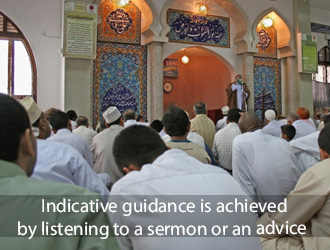 book, a CD, a piece of advice, a lecture or a symposium. This is the indicative guidance and it is considered the most exalted Divine Treatment of the heedless, and in return, man's best stance towards this guidance is to respond to it:
book, a CD, a piece of advice, a lecture or a symposium. This is the indicative guidance and it is considered the most exalted Divine Treatment of the heedless, and in return, man's best stance towards this guidance is to respond to it:
﴾You who believe! Answer Allah (by obeying Him) and (His) Messenger when he (peace be upon him) calls you to that which will give you life ﴿
It is guidance to the Right Path and it is Divine Advice:
﴾O you who believe! Turn to Allah with sincere repentance! ﴿
﴾Has not the time come for the hearts of those who believe (in the Oneness of Allah - Islamic Monotheism) to be affected by Allah's Reminder (this Qur'an), and that which has been revealed of the truth ﴿
Till when will you stay indulged in pleasures
although you will be held responsible for all your deeds?
The most fortuned man on earth is the one who responds to the wake-up call of the indicative guidance, Divine Advice, the Noble Quran, the Prophetic Hadith, a sermon, a religious lesson, a religious debate or a religious symposium. When this man realizes such an indication, he says, "O Lord, I am turning back to you". This is the most perfect type of guidance which comes to you from the Quran, the Sunnah, a scholar, a missioner a sermon or a religious session, while you are healthy in your house and amongst your children and family members, your dignity is preserved and your conditions at work are good. If you don't respond to this wake-up call and you continue sinning, following your lusts, turning a deaf ear to the Divine Call, disregarding all the Divine Alerts and keeping overcome by his lusts, there will be other Divine Stages:
﴾They will say: "Our Lord! Our wretchedness overcame us ﴿
What will happen next?
I would like to repeat what I've just said, the first stage is the indicative guidance which is nice, easy on you and peaceful. Every one of you should adopt this method if you want to punish someone who makes a mistake; you should offer him a piece of advice before punishing, bashing and flaming up with rage.
2- The disciplinary guidance:
When man doesn't respond to the indicative guidance, there will be the disciplinary guidance and this one is so much harder. The situation of the sinner who goes through this stage resembles the 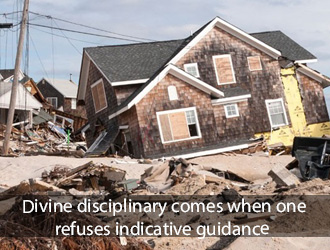 one of the patient whose doctor says to him, "You have an ulcer or an acute inflammation in your stomach. There are two ways to treat it; you should follow a strict diet on milk only for an entire month, and so you won't need a surgical procedure, or you should go under the knife if you eat whatever you want. It is totally up to you." The Almighty Allah says:
one of the patient whose doctor says to him, "You have an ulcer or an acute inflammation in your stomach. There are two ways to treat it; you should follow a strict diet on milk only for an entire month, and so you won't need a surgical procedure, or you should go under the knife if you eat whatever you want. It is totally up to you." The Almighty Allah says:
﴾To Allah belongs all that is in the heavens and all that is on the earth, and whether you disclose what is in your ownselves or conceal it, Allah will call you to account for it. Then He forgives whom He wills and punishes whom He wills. And Allah is Able to do all things. ﴿
﴾To Allah belongs all that is in the heavens and all that is on the earth, and whether you disclose what is in your ownselves ﴿
It is a reference to the diseases:
﴾or conceal it, ﴿
Allah is the Almighty Merciful Lord:
﴾Allah will call you to account for it.﴿
Whether you mention it or not, whether you admit it or not or whether you hide it or disclose it:
﴾To Allah belongs all that is in the heavens and all that is on the earth, and whether you disclose what is in your ownselves or conceal it, Allah will call you to account for it. ﴿
The choice is yours, O believer:
﴾Then He forgives whom He wills ﴿
After repenting, responding to the wake-up call and becoming straight on Allah's Path:
﴾and punishes whom He wills ﴿
This punishment is through the disciplinary guidance.
Hence, the first stage is the indicative guidance, but if you don't respond, you will go through a tougher stage, which is the disciplinary guidance. You should believe beyond doubt that Allah loves you, and he will not let you do whatever you like without disciplining you, so you will come to him either willingly, or unwillingly. A man asked me once about the core of my Da'wah (Call to Allah), and I answered him with a sense of humor, saying, "The core of Da'wah is that either you come to Allah running or He makes you run to him." You should take initiative by turning in repentance to Allah and regret all your sins, or else Allah will compulsorily bring you to Him.
A man told me that one year he made good money in the seventies. He said, "I wanted to travel abroad without my wife in order to spend hefty money on pleasures and whims", and that was his plan then. After getting there, he had severe pain in his back, and when he was admitted to the hospital, he was told that according to the diagnosis of his pain, he suffered from a tumor in the spinal cord. He cut his trip short and came back to Syria, and he spent his time in the Masajid and the clinics of doctors till the Almighty Allah cured him from his disease. The Almighty Allah is All-Wise. Each one of us has shortcomings, so our money has no weight in the Sight of Allah unlike our dignity. Besides, the Almighty Allah treats us in order to bring us closer to Him, because He loves us, and because he created us to grant us happiness, have mercy upon us and admit us to a Paradise as wide as the heavens and the earth.
By Allah dear brother, when all facts are unfolded on the Day of Resurrection, the believer will melt out of love to the Almighty Allah because of all the calamities He afflicted him with in the worldly life. Allah might bestow things upon you which may make you away from Him, and He might withdraw things from you in order to bring you closer to Him, and if only Allah unfolds the wisdom behind His withdrawal, you will realize that it is but bestowal. I used to say to you that diamond is charcoal that is exposed to pressure and heat. There is a big diamond in Istanbul that is worth 150 million dollars, but I wonder, how much does a charcoal of the same size cost? It costs five cents. The difference between the two is that the diamond is a charcoal that is exposed to pressure and heat. Much in the same line, unless you are pure you will never be admitted to Paradise, and the purification in the worldly life is gained through the Divine Treatment ( calamities which resemble the pressure and heat in my example), and so you should be pleased whenever Allah afflicts you.
out of love to the Almighty Allah because of all the calamities He afflicted him with in the worldly life. Allah might bestow things upon you which may make you away from Him, and He might withdraw things from you in order to bring you closer to Him, and if only Allah unfolds the wisdom behind His withdrawal, you will realize that it is but bestowal. I used to say to you that diamond is charcoal that is exposed to pressure and heat. There is a big diamond in Istanbul that is worth 150 million dollars, but I wonder, how much does a charcoal of the same size cost? It costs five cents. The difference between the two is that the diamond is a charcoal that is exposed to pressure and heat. Much in the same line, unless you are pure you will never be admitted to Paradise, and the purification in the worldly life is gained through the Divine Treatment ( calamities which resemble the pressure and heat in my example), and so you should be pleased whenever Allah afflicts you.
A man was circumambulating the Ka'bah and saying, "O Lord, are you pleased with me?" Imam Ash-Shafi'i was right behind him, so upon hearing the man saying that, he said, "Are you pleased with Allah, so that Allah will be pleased with you?" The man asked, "Glory be to Allah! Who are you?" Imam Ash–Shafi'i said, "I am Muhammad Ibn Idrees". The man asked again, "How can I be pleased with Him, and He is the One Whom I am seeking His content?" Imam Ash-Shafi'i said, "You can be pleased with Him when you are pleased with calamities the same way you are with graces." It is said: "Being pleased with the worst of Qada' is the highest level of certainty. Your heroism lies in saying, "Alhamdulillahi Rabil Alameen (Praise be to Allah, the Lord of the worlds)" whenever Allah afflicts you with a calamity, Allah forbid. You should deeply believe that all the Divine Actions are merciful, wise and just, so if you do not respond to Allah when He wants to bring you closer to Him (by calamities), you will go through the disciplinary stage, through which Allah will afflict you with calamities tough enough to make you obey Him. This is the meaning of the following Ayah:
﴾Then, He accepted their repentance, that they might repent (unto Him). ﴿
This means that they repented and Allah accepted their repentance:
﴾Then, He accepted their repentance, that they might repent (unto Him). ﴿
One of the interpretations of the Ayah is: Allah afflicts them with calamities that are tough enough to make them repent. Heroism lies in approaching Allah before He afflicts you with hardship, in offering Salah before a disaster befalls you and in resorting to Allah while you are healthy, wealthy, powerful, rich and sound. The most important thing in the Divine Discipline is to turn to Allah with sincere repentance. When Allah calls you through the indicative guidance, you should respond to Him, otherwise you will go through the Divine Disciplinary Stage after which you should repent, but if you don't, there is a third stage.
3- Istidraj:
The third stage can be survived by few people only and it is called Istidraj (it is defined as a situation where someone is kept getting bless from Allah in terms of success, money and all sort of worldly things abundantly and continuously in his life). According to it Allah gives you the worldly life; money, positions, pleasures and lusts, so that you might be humble to Allah, you might repent and you might be grateful to Him. The perfect stance of you (to be a survival of this stage) is to be grateful to Allah and to repent.
4- Destruction and demise:
If Allah guides you, but you don't respond to His Guidance, if Allah disciplines you, but you don't repent and if Allah bestows graces upon you, but you don't thank him, then you will be put into the  fourth stage, I seek refuge with Allah from it, because it is "destruction":
fourth stage, I seek refuge with Allah from it, because it is "destruction":
﴾So, when they forgot (the warning) with which they had been reminded, We opened to them the gates of every (pleasant) thing, until in the midst of their enjoyment in that which they were given, all of a sudden, We took them to punishment, and lo! They were plunged into destruction with deep regrets and sorrows. ﴿
Dear brother, these are the four stages. Let me repeat them:
- The first stage: The indicative guidance and your perfect stance towards it is to respond to Allah, because He calls you to that which will give you life.
- The second stage: The disciplinary guidance and your perfect stance towards it is to repent.
- The third stage: Istidraj and your perfect stance towards it is to be grateful to Allah.
- The fourth stage: Destruction.
Beware of reaching a deadlock between you and the Almighty Allah:
The gravest thing in man's life is to reach a deadlock between him and Allah, but how does this happen? Suppose, Allah forbid, that someone committed a murder, and was taken to prison, prosecuted in the criminal court and sentenced to death. Then this sentence was taken to the supreme court of appeals which approved the sentence of the criminal court. After that, the sentence was taken to the president who approved the sentence as well, and they appointed the date on which this man would be executed, so whatever he does before he meets his doom, will change nothing. If he wants to laugh, let him laugh, if he wants to cry, let him cry and if he wants to beg for forgiveness let him do that, but none of which will stop the execution, because this man reached a deadlock.
prosecuted in the criminal court and sentenced to death. Then this sentence was taken to the supreme court of appeals which approved the sentence of the criminal court. After that, the sentence was taken to the president who approved the sentence as well, and they appointed the date on which this man would be executed, so whatever he does before he meets his doom, will change nothing. If he wants to laugh, let him laugh, if he wants to cry, let him cry and if he wants to beg for forgiveness let him do that, but none of which will stop the execution, because this man reached a deadlock.
Hence, I advise myself and those who are around me to beware of reaching a deadlock. Beware of oppressing and hurting people, because destruction and revenge will be the effect of doing that, so leave a room for reconciliation and call yourself to account before you are called to do so and then ask yourself, "Do my deeds please Allah? Am I oppressing anyone? Am I gaining my triumph at the expense of destroying people? Am I building my life on the death of sh3er? Am I establishing my glory on their humiliation? Do I collect my wealth by impoverishing people? Call yourselves to account before you are called to do so and weigh your own deeds before they are weighed against you.
The prudent learns from words, whereas animals learn from reality:
Allah's Sunnah (way of dealing with His creations) starts with the indicative guidance, then the  disciplinary guidance, then Istidraj and finally destruction. Your heroism lies in responding to Allah in the first stage by listening and reacting positively, which is the most perfect stance man can take, and the more exalted he is, the quicker he learns his lesson from words, not from reality. If someone reads a scientific essay about the dangerous effects of smoking on health, or he understands the Shari'ah ruling on smoking cigarettes, and he quits smoking accordingly, he is considered in the highest levels (of comprehending), but if he quits smoking after he had a cancerous tumor, he then dealt with smoking emotionally, not rationally.
disciplinary guidance, then Istidraj and finally destruction. Your heroism lies in responding to Allah in the first stage by listening and reacting positively, which is the most perfect stance man can take, and the more exalted he is, the quicker he learns his lesson from words, not from reality. If someone reads a scientific essay about the dangerous effects of smoking on health, or he understands the Shari'ah ruling on smoking cigarettes, and he quits smoking accordingly, he is considered in the highest levels (of comprehending), but if he quits smoking after he had a cancerous tumor, he then dealt with smoking emotionally, not rationally.
Consider the following example: If someone drove his car to Homs (Syrian city) in winter, and after he left Damascus he read a sign on the road that says "The street to Homs is closed due to snow accumulation in Nabk". He was heading to Homs and he was about to cash lots of money there, but the road is closed and the man is still close to Damascus, so what should he do? Should he go back to Damascus? What did make him hesitant? The sign made him change his mind and went back to Damascus, whereas the only way for an animal to stop is to feel and see the snow (not to read the sign). We can say that the actions of the prudent are based on the words, while the ones of the animal are based on reality.
Ask yourself the following embarrassing question, "What does control me? Is it the Quran and Sunnah, or reality? The one who considers his reason is a very exalted person, but the one who considers his sentiments is an idiot. The more sublime you are, the fearer you will be from mere words, religious text, Divine Warning and Divine Menaces as you use your reason in that fear, whereas the one who does not use his reason, will be in a lower level, and so he says upon being afflicted with Qada' or a disaster:
﴾He will say: "Alas! Would that I had sent forth (good deeds) for (this) my life!"* So on that Day, none will punish as He will punish* And none will bind as He will bind. ﴿
Believing is a matter of time only:
Dear brother, pay attention to this important point: Choosing to believe is a matter of time unlike your other choices in life, as you have the free will to say yes or no. For instance you can accept to buy this house or refuse it and you can accept to marry this girl for her traits or to reject her, so you own the freedom of choice in million matters in life. However, your choice with regard to faith is a matter of time (when you are dying, reality will unfold before your eyes and you will believe then). The proof is Fir'aun, who is the fiercest infidel on earth, and he is the one who said:
﴾Saying: "I am your lord, most high", ﴿
He also said:
﴾Fir'aun (Pharaoh) said: "O chiefs! I know not that you have an ilah (a god) other than me,﴿
This man elevated himself to Divine Status, but when drowning overtook him, he said:
﴾"I believe that La ilaha illa (Huwa): (none has the right to be worshipped but) He," in Whom the Children of Israel believe,﴿
Hence, he believed, simply because everyone will believe when he is about to die:
﴾Now We have removed your covering, and sharp is your sight this Day!" ﴿
Unfortunately, this kind of faith is worthless (because it comes too late). Therefore, your choice with faith is limited to time and it is not a subject of acceptance or refusal.
Dear brother, this lesson is about what happens when man is driven by his lusts in the worldly life in a way that is against the Divine Method? Allah the Almighty will discipline him gently. Allah's Discipline consists of four stages:
- The first stage: The indicative guidance and your perfect stance towards it is to respond to Allah (because He calls you to that which will give you life).
- The second stage: The disciplinary guidance and your perfect stance towards it is to repent.
- The third stage: Istidraj and your perfect stance towards it is to be grateful to Allah.
- The fourth stage: Destruction
The scientific topic:
The Quranic command is an obligation entails unless there is an evidence of the otherwise:
Dear brother, let us move to the scientific topic and the inimitability of the Quran and Sunnah.
Dear brother, one of the axioms in Ilm Al-Usool (Science of Fundamentals in Islam), is that every command in the Noble Quran entails obligation. However, the scholars of Ilm Al-Usool added, "Unless an evident fact proved the otherwise". Hence, if the Almighty Allah says:
﴾Then whosoever wills, let him believe, and whosoever wills, let him disbelieve ﴿
This seems to be an order to embrace Kufr (infidelity), while it is in fact a threatening order. Also when Allah says:
﴾And marry those among you who are single (i.e. a man who has no wife and the woman who has no husband) ﴿
This is a recommended order. Furthermore, when also Allah says:
﴾and eat and drink ﴿
This is a recommended order; the Ayah indicates the permissible nature of that order. If there is no evidence to prove the otherwise, then the order is considered an obligation. Hence, every order in the Quran entails obligation.
Let us move to the cow (its milk is the scientific topic for today) which is the factory of milk.
1- Reflecting on cow's milk:
Pay attention to the following command:
﴾Then let man look at his food, ﴿
 This is an obligation, and you are Divinely assigned according to this Ayah to reflect on your food. The cow, which produces milk to you, is actually a silent factory. It eats grass and gives you whole food in its milk. The cow udder has a dome shape and it is wrapped by capillaries from which the udder takes what it needs in order to make milk:
This is an obligation, and you are Divinely assigned according to this Ayah to reflect on your food. The cow, which produces milk to you, is actually a silent factory. It eats grass and gives you whole food in its milk. The cow udder has a dome shape and it is wrapped by capillaries from which the udder takes what it needs in order to make milk:
﴾From between excretions and blood, pure milk; palatable to the drinkers. ﴿
The blood contains uric acid, toxic substance and other substances that are only known by Allah. Blood also contains proteins, fats, carbohydrates, minerals, semi-minerals and the discharges of some organs...etc.
2- How can the mammary cell select milk ingredients from blood?
How can the udder choose only the ingredients which the milk consists of? The mammary cell takes what it needs from blood and gives one drop of milk which pours into the udder. The cow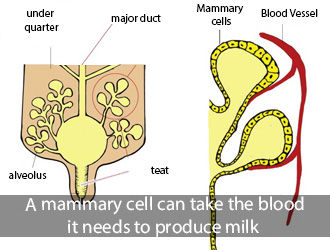 udder produces 20-30 or even 40 kilograms of milk. This udder is braced by two orthogonal walls from inside. In fact, the cow udder is divided into four cavities each of which has its own nipple, thus if four brother own a cow, and each one of them milks the cow from one of the fourth nipples, every brother will get an equal amount of milk. The mammary cell takes its needs from the blood, but is it a rational cell? Man's need for carbohydrates, protein, fat, vitamins and other ingredients are all found in the milk and they are taken from blood, so milk is considered whole food for man. Actually, the calf needs only few kilograms of that milk, leaving the rest of the 60 kilograms for man:
udder produces 20-30 or even 40 kilograms of milk. This udder is braced by two orthogonal walls from inside. In fact, the cow udder is divided into four cavities each of which has its own nipple, thus if four brother own a cow, and each one of them milks the cow from one of the fourth nipples, every brother will get an equal amount of milk. The mammary cell takes its needs from the blood, but is it a rational cell? Man's need for carbohydrates, protein, fat, vitamins and other ingredients are all found in the milk and they are taken from blood, so milk is considered whole food for man. Actually, the calf needs only few kilograms of that milk, leaving the rest of the 60 kilograms for man:
﴾And the cattle, He has created them for you ﴿
They were created especially for you:
﴾And the cattle, He has created them for you ﴿
"For you" means that they were designed to meet your needs. The amount of milk, which is produced in the entire world, is tremendous. There is a variety in the dairy products such as milk, yogurt, cheese, butter and ghee, and they are amazing:
﴾And the cattle, He has created them for you ﴿
Allah the Almighty says:
﴾Then let man look at his food, ﴿
In order for 1 cc of milk to be produced, 300-400 cc of blood is needed to pass around the mammary cells. No one knows how the mammary cell works, but what we know is that it chooses its needs from blood in order to make milk. The Almighty Allah says:
﴾Then let man look at his food* That We pour forth water in abundance* And We split the earth in clefts* And We cause therein the grain to grow* And grapes and clover plants (i.e. green fodder for the cattle)* And olives and date-palms* And gardens, dense with many trees* And fruits and Abba (herbage, etc.)* (To be) a provision and benefit for you and your cattle ﴿
This is one of Allah's Signs mentioned in the Quran.
The cow eats three meals daily. Who created this milk, this yogurt, this butter and this cheese? 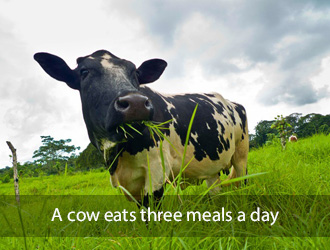 Who designed that?
Who designed that?
Ibn Abbas said: The Prophet, peace be upon him, said:
((When one of you eats food, he should say: O Allah, bless us in it, and give us food (or nourishment) better than it. When he is given milk to drink he should say: O Allah, bless us in it and give us more of it, for no food or drink satisfies like milk.))
I hope that you reflect on your food as a response to the Divine Command in the Noble Quran since every order in the Quran entails obligation.
Reflect on fruits and crops:
Fruits ripen consecutively, for Allah programmed the fruits to ripe that way in summer. Almonds ripen first, then cherries ripen, then apricots ripen, then apples ripen, then pears, then peaches and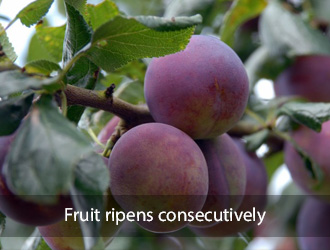 after them all the grapes ripen. If they ripped all at once in one day, we wouldn't be able to have them all summer round, would we? Other kinds of fruits ripen through long period of time, like watermelon which needs the three months of summer to ripen, so every day we can take a truck-load of watermelon. Unlike the fruits, crops ripen in one day like wheat, and if they ripped in three months, man would be exhausted in harvesting them. Can you imagine the farmer holding one spike of wheat every day and asking himself, "Is it ripe, so that I can reap it?" For this reason, wheat crops ripen in one day, whereas fruits are Divinely programmed to ripen consecutively, and some of them need the three months of summer to ripen. Who designed that? Who programmed them? Whose Wisdom is that? Ponder the apple; its size is reasonable, its color is bright, its smell is aromatic, its shape is accepted, it is covered with a protective skin and you can eat it using your teeth. If the apple were as hard as the rock, you would need a mill to eat it. Also, if the smell of the apple were unpleasant, you would not eat it. Hence, ponder the fruits one by one.
after them all the grapes ripen. If they ripped all at once in one day, we wouldn't be able to have them all summer round, would we? Other kinds of fruits ripen through long period of time, like watermelon which needs the three months of summer to ripen, so every day we can take a truck-load of watermelon. Unlike the fruits, crops ripen in one day like wheat, and if they ripped in three months, man would be exhausted in harvesting them. Can you imagine the farmer holding one spike of wheat every day and asking himself, "Is it ripe, so that I can reap it?" For this reason, wheat crops ripen in one day, whereas fruits are Divinely programmed to ripen consecutively, and some of them need the three months of summer to ripen. Who designed that? Who programmed them? Whose Wisdom is that? Ponder the apple; its size is reasonable, its color is bright, its smell is aromatic, its shape is accepted, it is covered with a protective skin and you can eat it using your teeth. If the apple were as hard as the rock, you would need a mill to eat it. Also, if the smell of the apple were unpleasant, you would not eat it. Hence, ponder the fruits one by one. 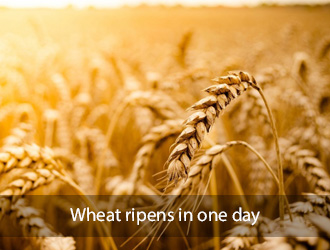 You should know that part of your faith is to reflect on your graces, and such reflecting leads you to get acquainted with Allah:
You should know that part of your faith is to reflect on your graces, and such reflecting leads you to get acquainted with Allah:
﴾Then let man look at his food﴿
Who designed the fruits, wheat, barley, chickpeas, lintel, the food we eat, the milk we drink and the fruits we eat? Can anyone describe the taste of any of the fruits? Can anyone describe the taste of pears, peaches, apples or berries? No one can because they are all sweet, but each of which has its own taste, so can anyone describe to me the taste of any fruit without mentioning its name? No one can. All these different fruits of different tastes are watered with the same water, but some of them Allah made more excellent than sh3er to eat. Allah the Almighty says:
﴾Watered with the same water, yet some of them We make more excellent than sh3er to eat.﴿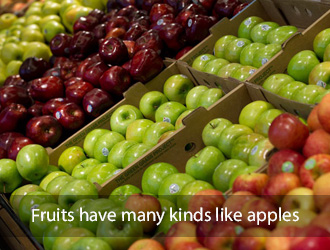
These are the words of the Quran. The Almighty Allah draws your attention by saying to you:
﴾Watered with the same water, yet some of them We make more excellent than sh3er to eat.﴿
Some fruits have many kinds, such as the apples. There are the yellow apple, the red apple, the green apple with tart flavor and the small sweet apple. Who designed all these kinds of apples? Hence, in order to know Allah we should reflect on His creations. Again:
﴾Then let man look at his food﴿
This is a Quranic order which entails obligation.




